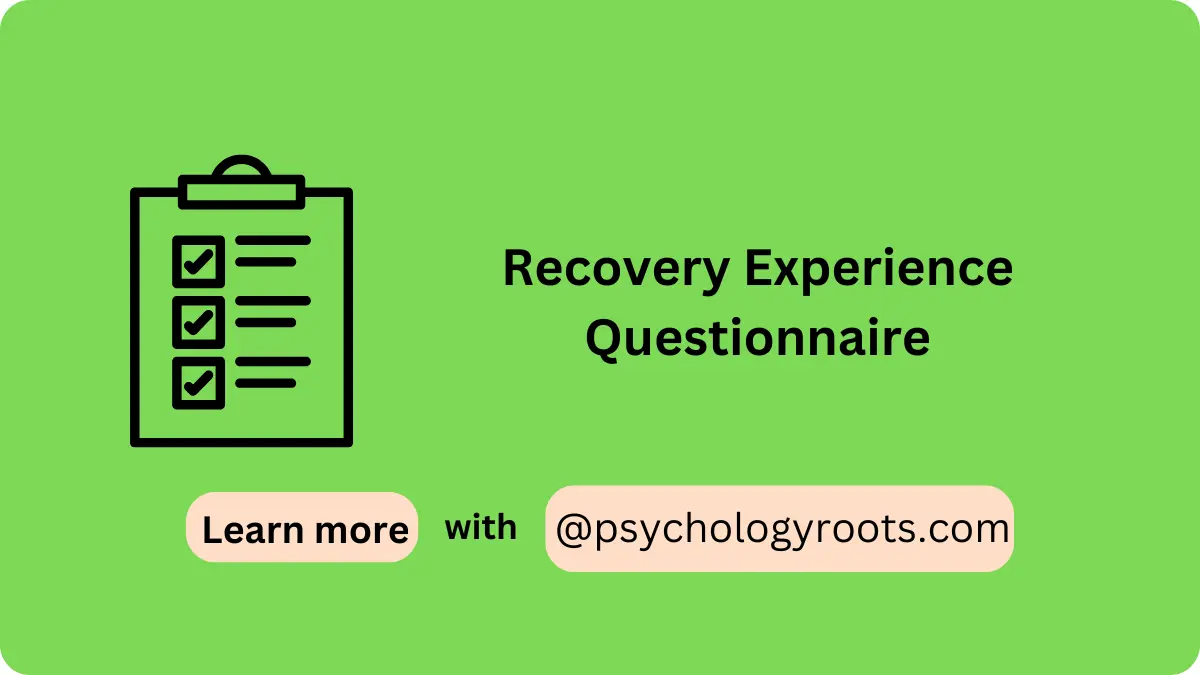Table of Contents
Recovery Experience Questionnaire
Here in this post, we are sharing the “Recovery Experience Questionnaire”. You can read psychometric and Author information. We have thousands of Scales and questionnaires in our collection (See Scales and Questionnaires). You can demand us any scale and questionnaires related to psychology through our community, and we will provide you with a short time. Keep visiting Psychology Roots.
About Recovery Experience Questionnaire
Scale Name
Recovery Experience Questionnaire
Author Details
Sabine Sonnentag and Charlotte Fritz
Translation Availability
English

Background/Description
The Recovery Experience Questionnaire (REQ), developed by Sonnentag and Fritz in 2007, is a psychological tool designed to measure how individuals recover from work-related stress. It focuses on four key dimensions of recovery: detachment, relaxation, mastery, and control. These dimensions reflect the psychological processes that allow individuals to unwind, recharge, and maintain well-being after periods of occupational strain.
The REQ has been extensively used in occupational health research to explore the relationship between work stress, recovery experiences, and overall health outcomes. Detachment refers to the ability to mentally disconnect from work, while relaxation captures the state of reducing physical and mental tension. Mastery involves engaging in challenging activities that build skills or provide a sense of achievement, and control relates to the degree of autonomy individuals feel during their leisure time.
This tool has been instrumental in identifying factors that contribute to work-life balance and employee well-being, making it valuable for both research and organizational interventions aimed at improving workplace mental health.
Administration, Scoring and Interpretation
- Obtain an official copy of the Recovery Experience Questionnaire along with the scoring guide.
- Explain the purpose of the questionnaire, highlighting its focus on measuring recovery from work-related stress.
- Provide participants with instructions for completing the questionnaire, emphasizing the importance of honest and reflective responses.
- Inform participants that the questionnaire typically takes 10–15 minutes to complete.
- Administer the REQ in a quiet environment to ensure focus and accuracy.
Reliability and Validity
The Recovery Experience Questionnaire demonstrates robust psychometric properties. It has high internal consistency across its four dimensions, indicating that each subscale reliably measures its intended construct. Test-retest reliability confirms the stability of the scale over time.
In terms of validity, the REQ has strong construct validity, as evidenced by significant correlations with measures of job stress, burnout, and well-being. Its predictive validity is well-supported in studies linking recovery experiences to enhanced mental health, job satisfaction, and performance.
Available Versions
Multiple-Items
Reference
Sonnentag, S., & Fritz, C. (2007). The Recovery Experience Questionnaire: development and validation of a measure for assessing recuperation and unwinding from work. Journal of occupational health psychology, 12(3), 204.
Important Link
Scale File:
Frequently Asked Questions
What does the Recovery Experience Questionnaire measure?
It measures four dimensions of recovery from work stress: detachment, relaxation, mastery, and control.
Who developed the REQ?
Sonnentag and Fritz developed it in 2007.
How long does it take to complete the REQ?
It typically takes 10–15 minutes to complete.
Why is the REQ used in occupational health?
It helps assess the effectiveness of recovery experiences in reducing work stress and enhancing employee well-being.
Is the REQ a reliable and valid tool?
Yes, it has demonstrated strong reliability and validity in research.
Disclaimer
Please note that Psychology Roots does not have the right to grant permission for the use of any psychological scales or assessments listed on its website. To use any scale or assessment, you must obtain permission directly from the author or translator of the tool. Psychology Roots provides information about various tools and their administration procedures, but it is your responsibility to obtain proper permissions before using any scale or assessment. If you need further information about an author’s contact details, please submit a query to the Psychology Roots team.
Help Us Improve This Article
Have you discovered an inaccuracy? We put out great effort to give accurate and scientifically trustworthy information to our readers. Please notify us if you discover any typographical or grammatical errors.
Make a comment. We acknowledge and appreciate your efforts.
Share With Us
If you have any scale or any material related to psychology kindly share it with us at psychologyroots@gmail.com. We help others on behalf of you.